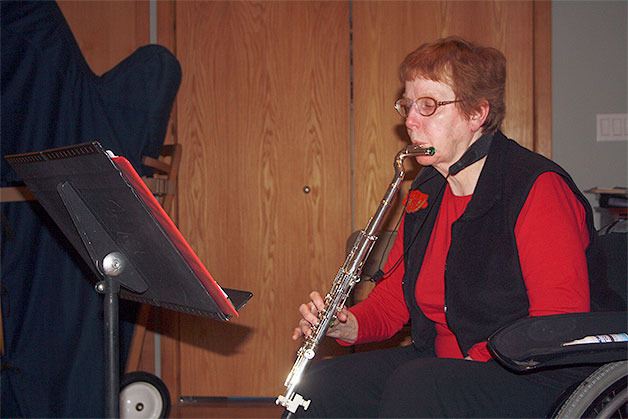When Rae Terpenning had her stroke, her entire life was interrupted.
A flutist, Terpenning lost much of the function in her left side and, as a result, was unable to play anymore.
But now Terpenning is performing Christmas carols with a flute choir, thanks to a one-handed flute.
Feb. 15, 2010, is a day Terpenning and her husband Charles describe as, “a day we won’t forget,” Terpenning said.
She spent six weeks in the hospital after a stroke before she returned home. After that, physical therapists went to her to help her regain function.
“I always was counting on rehab getting my hand to work again,” Terpenning said, “and although I’m much better than when I first had my stroke, I finally realized … it’s going to be a long, long time before I could play, if I waited for that.
“I had a therapist who said, ‘Just because you get a one-handed flute doesn’t mean you’re giving up on rehabbing your other arm. It’ll just be that you can play sooner with the one-handed flute.’ ”
After that, Charles Terpenning, also a professional musician who plays with the Saratoga Orchestra, searched the internet for someone who could help them get Terpenning playing again.
Finally, they found Maarten Visser, an adaptive woodwind maker living in Amsterdam, and one year later, Terpenning has her flute.
After a long process, she finally received her flute, and when she got all the pieces, she said she felt “like my heart grew three sizes that day.”
“It was fabulous,” Terpenning said. “It still is. Knowing that I can play with other people and make music, when it’s been an essential part of my life since I was nine years old — that’s a few years. I was just so happy to be able to do that again, something I thought I might never be able to do again.
“But as the saying goes, never, never, never give up.”
She’s had her flute for less than a month, and already she’s performed twice playing Christmas carols. But it’s still a process because she’s basically having to learn how to play all over again, this time without the benefit of an experienced teacher.
“There’s no book, nobody else who has experience doing this,” Terpenning said. “You have to make it up yourself. You have to make your own rules. So I have to do a lot of experimenting to find where to put it and how to hold it and different things like that.”
Charles Terpenning said hearing flute music from their music room again was “such a thrill.”
“I know one time, she just took … the first piece she ever studied with her teacher at New England Conservatory, and she dug that music out and just sat there and figured a few things out,” he said, “and within a few minutes, I said, ‘I know that piece. I know what you’re playing.’
“It was far from perfect or finished or anything, but the notes, I recognized the notes. I recognized what it was supposed to be, and I said, ‘Hey, that’s good.’ ”
But Rae Terpenning’s goal, when they started the process around Christmastime in 2013, was to be able to play Christmas carols by Christmas this year. She’s realized that dream, and is onto her next goal.
“I want to go back and try to learn some of the easy, quote unquote, literature,” she said. “I’ll have to relearn them, of course, but I’d like to see if I can get back and play some of the real repertoire for the instrument.”
The important thing for the Terpennings, however, isn’t just that Rae can make music once again after five years, but that others know that it’s possible.
“I just want to be able to give people hope that they can do it,” she said. “Not because I did it and because I’m good. The idea is to let them know that they can do it if they want to. And as another therapist said, ‘It may not be the way you used to do it, but there is a way to do it. And you’ll get back to playing again.’ ”
Charles Terpenning mentioned that they might share their story with the National Flute Association and at conferences and workshops in the future. He said he wants “not to let people think that’s the end of whatever they’re ever going to be able to do again.”
“I guess I was afraid to hope too much at the beginning,” Rae Terpenning said, “not knowing how it would really work, not knowing if I’d be able to play it again and make music again.”
She said when she was performing Christmas carols with her flute choir, she “was so busy concentrating on getting the right fingering, it was (only) after the performance that I was able to think about how it felt.
“It felt wonderful.”



